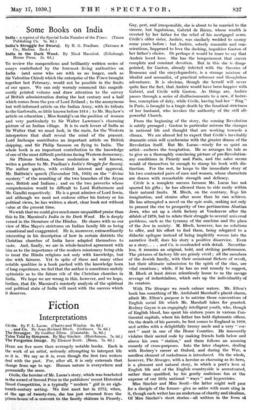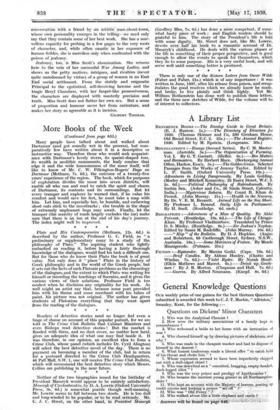Fiction
Interpretations
Cecile. By F. L. Lucas. (Chatto and Windus. 8s. 6d.) . . . and Co. By Jean-Richard Bloch. (Gollancz. 7s. 6d.) The Stranger. By Godfrey Elton. (Constable. 7s. 6d.)
Tales Told by Simpson. By May Sinclair. (Hutchinson. 75. 6d.) The Forgotten Image. By Eleanor Scott. (Bonn. 7s. 6d.) HERE are five more than averagely notable books. Each is
the work of an artist, seriously attempting to interpret life as it is. We say as it is, even though the first two writers
deal with the past. For, after all, it is only externals that change from age to age. Human nature is everywhere and perennially the same.
Cecile, the heroine of Mr. Lucas's story, which was bracketed in the award of Second Prize in the publishers' recent Historical Novel Competition, is a typically " modern " girl in an eigh- teenth-century setting. We first meet her in 1775, when, at the age of twenty-two, she has just returned from the prison-house of-a- convent to the family château in Picardy.
Gay, pert, and irresponsible, she is about to be married to the sincere, but lugubrious, Gabriel de Rieux, whose wealth is coveted by her father for the relief of his mortgaged acres. Cecile's older sister, Andree, was similarly wedded to money some years before : but Andree, soberly romantic and con- scientious, happened to love the dashing, impulsive Gaston of her father's choice. Or perhaps it would be truer to say that Andree loved love. She has the temperament that craves complete and constant devotion. But in this she is disap- pointed, for Gaston, already infected with the theories of Rousseau and the encyclopaedists, is a strange mixture of idealist and sensualist, of practical reformer and thoughtless adventurer. It is obvious, though she herself will never quite face the fact, that Andree would have been happier with Gabriel, and Cecile with Gaston. As things are, Andree passes through a series of disillusionments to a new, if lustre- less, conception of duty, while Cecile, having had her " fling " in.Paris, is brought to a tragic death by the fanatical strictness of her husband, who invokes the authority of the still all- powerful Church.
From the beginning of the story, the coming Revolution is subtly presaged ; Gaston in particular mirrors the changes in national life and thought that are working towards a climax. We are almost led to expect that Cecile's inevitably dramatic crisis will synchronize with the greater drama of the Revolution itself. But Mr. Lucas—wisely for so quiet an artist—eschews the temptation. He so arranges his tale as to give us a thoroughly convincing picture of pre-Revolution- ary conditions in Picardy and Paris, and the salon scenes would of themselves be enough to stamp his book with dis- tinction. For the rest, he keeps to the immediate story of his two contrasted pairs of men and women, whose characters are drawn with remarkable strength and delicacy.
Cecile is a complete success because Mr. Lucas has not spurred his gifts ; he has allowed them to ride easily within their natural limits. M. Bloch, on the contrary, flogs his imagination, and strains after more than he can achieve. He has attempted a novel on the epic scale, seeking not only to present the rise to prosperity of two pertinacious Alsatian -Jews, who set up a cloth factory at Vendeuvre after the &tack of 1870, but to relate their struggle to several universal problems, such as the tyranny of the machine and the place of the Jew in society. M. Bloch, however, has no solutions to offer, and his effort to find them, being relegated to a didactic epilogue instead of being implicitly woven into the narrative itself, does his story a positive disservice. Even as a story, . . . and Co. is overloaded with detail. Neverthe- less, it remains an original, bold, and striking performance. The pictures of factory life are grimly vivid ; all the members of the Jewish family, with their occasional flickers of revolt, but their ultimate submission to the spirit of the clan, are vital creations ; while, if he has no real remedy to suggest, M. Bloch at least drives relentlessly home to us the savage revenge of industrialism, which eats up the individuality of its creators.
With The Stranger we reach calmer waters. Mr. Elton's book has something of Mr. Archibald Marshall's placid charm, albeit Mr. Elton's purpose is to satirize those conventions of English social life which Mr. Marshall takes for granted. Rodney Gayne is an engagingly intelligent youth, who, though of English blood, has spent his sixteen years in various Con- tinental capitals, where his father has held diplomatic offices. On the death of his parents, he first comes to England in 1910, and settles with a delightfully breezy uncle and a very " cor- rect " aunt in one of the Home Counties. He innocently violates their sacred code by making friends both below and above his own " station," and there follows an amusing comedy of cross-purposes. Into the later chapters, dealing
with Rodney's career at Oxford, and during the War, a needless element of melodrama is introduced. On the whole, however, The Stranger, with a heroine as charming as its hero, is a pleasant and natural story, in which a poet's love of English life and of the English countryside is accentuated, rather than :qualified, by his gently malicious- fun at the expense of our little national " ways " and hypocrisies. Miss Sinclair and Miss Scott—the latter might well pass for a disciple of the former—give us satire with more sting in it, though each writer has an undertone of charity and idealism. Of Miss Sinclair's short stories—all written in the form of conversation with a friend by in artistic man-about-town, whose own personality emerges in the telling-we need only say that they contain some of her best work. She has a mar- vellous capacity for probing in a few pages to the very roots of character, and,. while often caustic in her exposure of human foibles, she is merciless Only when confronted with the poison of jealousy.
Jealousy, too, is Miss Scott's abomination. She returns here to the vein of her successful War Among Ladies, and shows us the .petty motives, intrigues, and rivalries (never quite unredeemed by virtue) of a group of women in an East End social settlement. From the stately and enigmatic Principal to the egotistical, Self-deceiving heroine and the tragic Beryl Chambers, with her limpet-like possessiveness, the characters are displayed with masterly precision and truth. Miss Scott does not flatter her own sex. But a sense of proportion and humour saves her from caricature, and makes her story as agreeable as it is incisive.
GILBERT THOMAS.















































 Previous page
Previous page